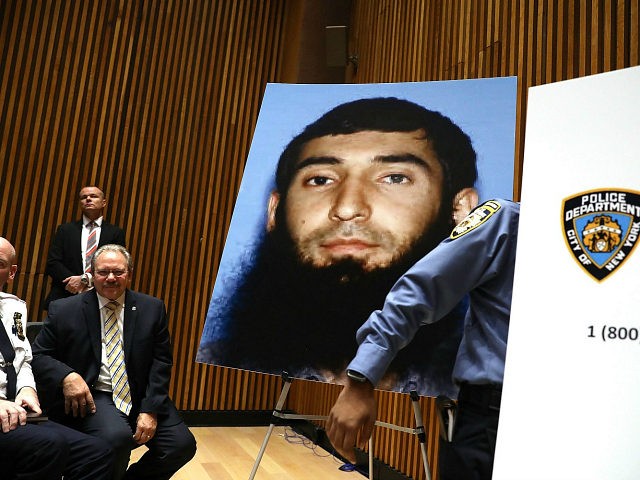TEL AVIV – The only way to combat lone wolf terror attacks is if the West comes together in a collaborative intelligence-sharing effort, a top Israeli police official told the Algemeiner on Wednesday in the wake of a truck-ramming attack in New York City.
“Terrorism knows no borders and no boundaries in today’s world,” Major General Avshalom Peled, head of the Israel Police’s training department, said. “No country is immune. No country can fight this war alone. We can only succeed if we unite together, share intelligence, ideas and experience, and face the challenge with a united front — Israel, the United States, Europe.”
A 29-year-old Uzbek national ploughed a pickup truck into a bicycle path near the World Trade Center on Tuesday, mowing down bicyclists and pedestrians. The suspect, identified as Sayfullo Saipov, left a note in the truck saying the attack was in the name of the Islamic State terror group. An NYPD official told NBC News that the Arabic-language note included the sentence, “The Islamic State lives forever.”
Peled expressed his condolences to the victims and their families.
“That’s what terror does, it takes the lives of innocent people,” Peled said. “The terrorists are trying to make people afraid and cause chaos.”
“Global jihad stands against democracy and the values it represents. Israel is a target, America is a target, Europe is a target, the entire non-Islamic, Western world is a target,” he added.
According to Peled, Israel has been battling the so-called lone-wolf terrorism intensively since 2014. What the attackers have in common “is the motivation of the ideology of extremist Islamic teachings, with the encouragement of Islamic terror organizations.”
“The terror organizations didn’t vanish, they still exist, unfortunately,” he said, “but lone wolves are more difficult to deal with.”
“This is because, generally, there is no prior intelligence,” he explained. “A lone wolf, most of the time, acts alone. It is his personal decision, which is usually a spontaneous one. He does not belong to a terror group and he is not usually known to authorities. Quietly, he or she picks a time and a place to attack. They are very hard to detect.”
Social media, Peled said, is “one of the main tools of incitement producing lone-wolf terrorists.”
In Israel, the police formulated “new procedures covering six main areas to deal with lone wolves — operational and tactical methods; intelligence; technology; dialogue; training; and public awareness.”
Israel’s other security institutions such as the Shin Bet and the IDF have partnered with the police in a joint effort to combat the threat of lone wolf attacks.
“We’re building responsive joint command centers, which enable us to respond quickly and effectively during an event,” he said.
Also, he continued, “the availability of intelligence information is critical and we share knowledge between the security agencies in real time. There are no ego arguments. Using this intelligence information, we can build a target bank of potential terrorists, who may then be arrested and questioned. We also use intelligence to build specific profiles of lone-wolf terrorists, which helps us focus on potential perpetrators.”
The police also monitor social media networks. “It’s very hard to get intelligence about a lone-wolf terrorist, so one of the tools to gather intelligence is to watch social media in different languages,” he said. “We know that all lone wolves got ideas of global jihad ideology from social media. So it is very important that we monitor social media inside the population of potential lone wolves.”
The public also play a crucial role, Peled noted.
“We highly developed this starting in the mid-1990s when we faced a wave of Palestinian suicide bombers,” he said. “We defined the public as a strategic partner of the police. They often alert us to dangers. In Israel, the partnership with the public is very wide.”
According to Peled, democratic nations “fight terrorism with one arm tied behind their backs, because there is always a balance between the security and the freedom of citizens. More security, less freedom. More freedom, less security. And a democracy must maintain this balance between security and freedom.”
While Israel has been “relatively successful” in combating lone-wolf terrorism, “there is no such thing as 100% success in this field,” he said.
“Nevertheless, our goal is 100%, and we’re improving our methods all the time.”
“In Israel, it’s much easier to define the community which the potential lone wolf will come from,” he said. In the U.S. the lone-wolf terror threat is “much more complicated.”
“I’m not here to teach the United States, it’s a great country,” he added. “But I think if we swap knowledge, we can improve our tools against the lone wolves. Israel is not more clever than America, it just has more experience.”
Lone-wolf attackers have long drawn inspiration from Palestinian terrorists. In the wake of a July 2016 truck ramming terror attack in Nice, France, an Islamic State supporter wrote on social media, “Killing by ramming using civilian cars and trucks is an idea born from the Maqdisi [Palestinian] mind, which has an innovative nature of thinking up jihad tactics.”
Going forward, Peled advised New Yorkers to “be alert, with a state of mind that they have to look for suspects and be the eyes and ears of the police on the ground.”

COMMENTS
Please let us know if you're having issues with commenting.